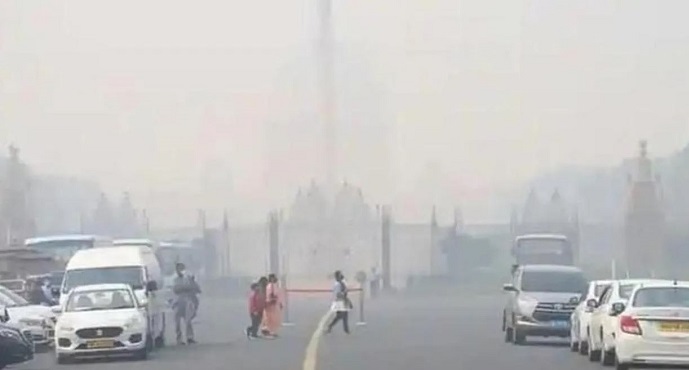
New Delhi: The overall air quality in the national capital on Thursday morning was recorded in the 'poor' category, with the Air Quality Index (AQI) at 256, as per SAFAR-India.
To mitigate pollution, water was sprinkled through an anti-smog gun in the Anand Vihar area, as according to the data from the System of Air Quality and Weather Forecasting and Research (SAFAR), the air quality in Delhi stands in the 'poor' category.
As per the latest data from SAFAR, the air quality around Delhi University was recorded at 316 (very poor) in the morning hours today.
Noida recorded an AQI of 269 (poor) and Gurugram 176 (moderate).
Meanwhile, to reduce pollution in the national capital, an anti-pollution drive is also going to start today.
A resident of the city, Bhagwati Prasad, while speaking to ANI, said that the situation is very bad and there seems to be no solution as it happens every year.
"The pollution situation is very bad. There has been coughing and burning in the throat for the last few days. There seems to be no solution, as it happens every year. There is a lot of traffic," Bhagwati Prasad said.
Earlier, on Wednesday, the overall air quality in Delhi was recorded in the 'moderate' category, with the Air Quality Index (AQI) at 190, as per SAFAR-India.
With this marginal improvement in the overall air quality on Wednesday, Environment Minister Gopal Rai urged the states in the National Capital Area to ban firecrackers ahead of the upcoming Diwali, keeping in view the measures put in place in the city to tackle pollution.
The minister said that during Dussehra, which was celebrated on Tuesday, there was less bursting of firecrackers and if the same continues for Diwali, then it will have a better impact on pollution levels in Delhi.
"I think that comparatively, firecrackers were burst at a lesser number of locations this time (during Dussehra). I would like to once again request that the states in Delhi-NCR ban firecrackers because they are easily available to people in their states.
I think if NCR states ban it too, this will have a better impact on Delhi," Gopal Rai said.
On the improvement, the Environment Minister said, "Two days ago, the AQI level in Delhi was above 300. A decrease in the AQI level has been recorded and it has come below 300. I think that in the days to come, this will keep fluctuating. It is being estimated that after October 30, this will perhaps go up again."
Further speaking on stubble burning, Gopal Rai said, "Stubble burning is going on but the number of such cases is low as of now. But it is being estimated that these cases will increase around October 30. It is to be seen what kind of impact the measures taken up in Punjab have."
As stubble burning continues in parts of Punjab and Haryana, air quality in the national capital has worsened in the past few days. According to data, over 2,500 cases of stubble burning have been reported this year so far. However, farm fire numbers are better than those of the previous two years.
The second phase of the Graded Response Action Plan (GRAP) was implemented in Delhi to reduce the effect of increased pollution.
The Air Quality Index is a tool for effective communication of air quality status to people in terms that are easy to understand. There are six AQI categories, namely Good + Satisfactory, Moderately Polluted, Poor, Very Poor, and Severe.
Each of these categories is decided based on the ambient concentration values of air pollutants and their likely health impacts (known as health breakpoints). According to the AQI scale, the air quality check between 0 and 50 is "good", 51 and 100 "satisfactory", 101 and 200 "moderate", 201 and 300 "poor", 301 and 400 "very poor", and 401 and 450 "severe". (ANI)







